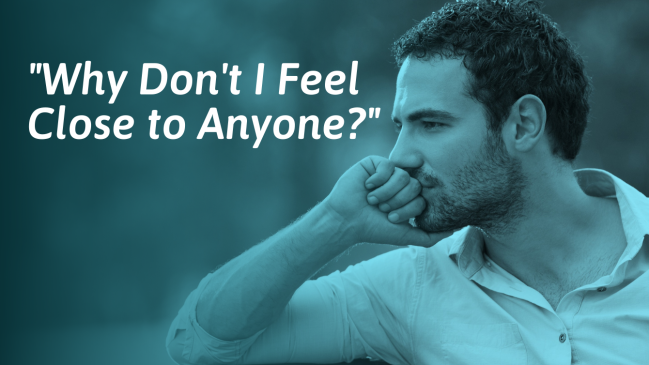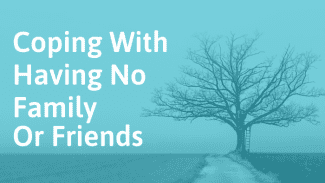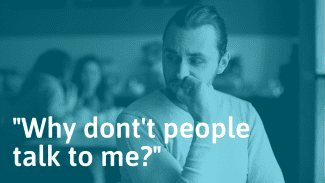“I don’t feel close to anyone. Not even my friends or people I have dated. I’m not sure how I can feel closer to people when every conversation seems so superficial.”
While it may feel like some people were born with the ability to get closer to others, it is likely a skill they developed over the years. Someone who grew up feeling close to family members learns what it feels like to feel close to someone, and it is usually easier for them to develop closeness in other relationships. Luckily, you can learn how to get close to people at any stage in life.
Reasons why you may not feel close to anyone
- You’re not being vulnerable. You’re not going to feel close to others if you don’t share your feelings and real self.
- You have a fear of getting close. If you have trust issues that you haven’t dealt with yet, you may be unconsciously sabotaging your relationships and preventing people from getting close. You may not recognize the signs that someone wants to get close to you or pull away when things start to feel intimate.
- You don’t see anyone regularly enough. It takes time to form close friendships. Simply seeing someone regularly may be enough to get us to start liking each other, in a process known as the mere proximity effect.[1]
- You haven’t found compatible friends. It can be difficult to get close to people if you don’t have anything in common with them or if you don’t respect them.
How to feel closer to other people
1. Evaluate your current friends
Look at your classmates, work colleagues, and other people who currently surround you. How close do you feel to them? Are there people that you would like to get close to? Or do you need to try and meet new friends?
Once you decide whether you would like to get closer to people around you or meet new friends, you can start taking the necessary steps.
Read our guide on not having close friends and how to meet like-minded people. If you aren’t sure whether your current friendships are healthy, you might find our article on signs of a toxic friendship helpful.
2. Ask questions
To feel close to someone, we need to get to know them. While some people freely share information about themselves, others are more reserved and wait until someone asks them. Show that you’re interested in people and want to get to know more about their life.
We have a list of 210 questions to give you some ideas for getting to know your friends better. Do you struggle to be naturally curious about people? We have some tips on how to be more interested in others if you’re not naturally curious.
3. Share about yourself
Relationships should be a give-and-take. Sharing about yourself will help you feel closer to people as they get to know the real you. As a result, they will probably feel more comfortable sharing about themselves, as well. Being vulnerable can be scary, but the payoff can be worth it.
It can take a while to learn when and how to open up to people, so don’t despair. You want to reach a point where you can let people know what’s going on with you in the right settings without “emotionally dumping” on them.
It’s important to note that no one alive gets it right all the time. Everyone has moments in life where we feel we may have over-shared or perhaps missed an opportunity to share when we didn’t recognize it. Don’t beat yourself up. Remind yourself that you’re learning.
4. Do fun things together
Being close to someone isn’t all about knowing each other. Shared experiences are powerful tools in bringing people closer together.
Be open to trying new things with your friends. If someone invites you to try an activity or go to an event, try it out. Look for exciting activities or events, like a guided hike, sculpting class, or a new form of exercise.
5. Give each other space
When we want to get close to someone, we may think that we need to spend as much time with them as possible.
But everyone needs time alone. Spending time apart allows you to gain different experiences that you can then come together to tell each other about and share.
Too much closeness can make us feel enmeshed and even trapped. The result may be intense but short relationships. To build long-lasting relationships, take your time and give space.
6. Be responsive and consistent
While giving space is important, it’s crucial to make sure your friends feel seen and heard. Answer calls and messages. Don’t leave your friends hanging. Let people in your life know they can trust you by showing up on time when you make plans, keeping their information private, and communicating any issues that come up.
Try to see and talk to the people you want to get close to regularly. Remember that it takes time to build close, long-lasting relationships.
7. Identify and deal with underlying issues
Often we find that issues we have from childhood and past experiences prevent us from feeling close to people.
For example, you may find that it’s hard for you to ask for support or recognize it when you get it. Compliments may feel uncomfortable. You may find that you constantly feel disappointed by your friends and others around you. Maybe you over-give and feel frustrated when others don’t meet you halfway. Or perhaps you have trust issues that fuel your fear of getting close.
Work on increasing your self-awareness regarding what is keeping you from feeling close to others in your life. Is it that you have never felt close to anyone or a recent issue? If something changed recently, try to pinpoint what that is and deal with the problem directly.
8. Give positive affirmations
We all like to feel good. Compliments make us feel pretty good about ourselves, and in turn, about the people who complimented us.
If there is someone you want to get close to, there are probably things you like or admire about them. Let them know. Tell your friend that you appreciate their positivity, organization skills, or how put-together they look.
9. Attend therapy
Building a relationship with a therapist can be a fantastic training ground for other relationships.
You may think that a relationship with a therapist doesn’t count because they are being paid to listen to you. But a good therapist will be invested in helping you master new tools that you will be able to transfer to other areas in your life.
In therapy sessions, you can practice things like asserting yourself when you feel that your therapist has misunderstood what you were trying to say. You can also practice making eye contact while sharing personal information and many more skills that will help you get closer to others.
In addition to practicing new skills, a therapist can help you explore and understand why you’re having difficulty getting close to people. Understanding how past experiences affect how you feel and act today can help you integrate with others and move forwards.
We recommend BetterHelp for online therapy, since they offer unlimited messaging and a weekly session, and are cheaper than going to a therapist's office.
Their plans start at $64 per week. If you use this link, you get 20% off your first month at BetterHelp + a $50 coupon valid for any SocialSelf course: Click here to learn more about BetterHelp.
(To receive your $50 SocialSelf coupon, sign up with our link. Then, email BetterHelp’s order confirmation to us to receive your personal code. You can use this code for any of our courses.)
10. Try support groups
Support groups can be another excellent opportunity to practice closeness to others, whether you can’t currently access traditional one-on-one therapy or as an addition.
Support groups can provide a platform to share your experiences with other people who are going through similar struggles. Most support groups have a rule against “cross-talk,” which means that members don’t comment on what other members have said. That means you can share whatever you’re going through without feeling judged or getting advice.
You can try online video support groups through Support Groups Central. Trained facilitators lead these support groups. Other support groups are peer-led. If you prefer a peer-led group, you can try Adult Children of Alcoholics and other Dysfunctional Families.
11. Refine your basic social skills
In some cases, a lack of social skills may be holding you back from making connections with others. These articles can help you develop key skills:
- Best social skills books for adults
- How to read and pick up on social cues
- Improve your social intelligence
Common questions about not feeling close to anyone
Is it normal to have no close friends?
Many people go through phases in their life where they don’t have close friends. It may be due to lack of social skills, being too busy with work or family life, or many other reasons. If it bothers you, you can learn to make new friends at any age.
Why am I scared to get close to anyone?
Sometimes we’re scared to get close to someone because we’re afraid that they will hurt or betray us in some ways. Other times, we may feel unworthy of people’s care and attention. We may fear that people will be disappointed once they get to know our true selves.





